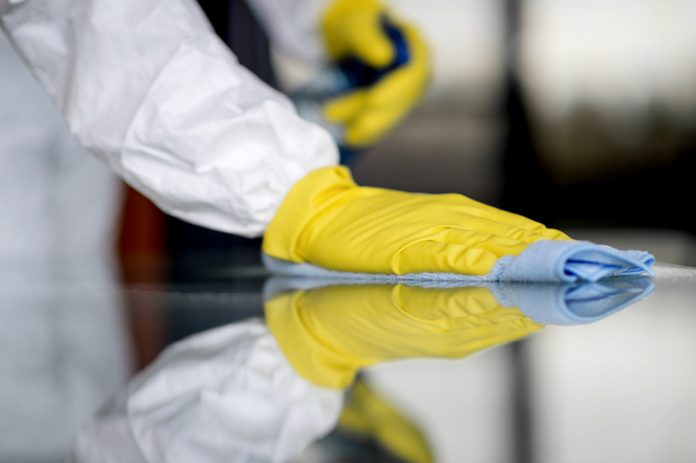
The lodging industry faces ever-increasing challenges regarding novel coronavirus (COVID-19). They include an unanticipated significant drop in occupancy, massive employee layoffs, and in some cases, the shuttering of hotels for indeterminate periods of time. Hotels must do all they can to contribute to the containment and eventual minimization of this pandemic—one that has the potential to adversely affect the health and wellbeing of every property’s guests, visitors, and employees, as well as everyone with whom they interact.
Here are specific steps that hotel managers whose properties are still open should consistently and immediately implement to control and minimize guest and employee exposure to COVID-19:
1Employees Come First
While unprecedented low occupancies would normally dictate laying off many staff until the pandemic subsides, it is essential that each hotel be thoroughly sanitized first. This will require a healthy labor force to accomplish this. Stagger shifts to prevent the simultaneous arrival and departure of large groups.
Seek out ways to avoid gathering of employees in a single location. Instead of holding start-of-shift standup meetings, prepare a written daily briefing to accompany each housekeeper’s room assignment list or list of assigned duties. To the extent feasible, each room attendant or house person should only interact with one employee throughout the day—their immediate supervisor.
At the start of each shift, the supervisor should verify with each reporting employee that they are not feeling ill. Employees that exhibit potential COVID-19 indicators, as well as those deemed vulnerable, should be sent home.
Upon reporting for work, require every employee to immediately wash their hands for at least 20 seconds using hot water and antibacterial soap. Require employees to rewash hourly or use a 60 percent ethanol or 70 percent isopropanol alcohol-based hand sanitizer.
2Sanitize All Surfaces
Sanitation of hard surfaces should begin with points of entry and exit. Use a hospital-grade disinfectant and clean rags or disposable wipes, sterilize all door handles (inside and out), full door surfaces, windows and latches, front desk counters, lobby tables and case goods, computer keyboards and computer mice, exterior printer surfaces, breakfast area containers, elevator doors, railing and control panels, stairwell railings, lobby televisions and include remote controls, and public restrooms. Disinfect all other hard surfaces in public areas, behind the front desk and back office to include all walls, mirrors, doors, luggage carts, telephones, staplers, tape dispensers, pens, and pencils. Only issue rooms keys from new stock that have been disinfected; do not recycle card keys at this time.
Using a methodical approach, deep clean every guestroom in the hotel to include all hard and soft surfaces. Every hard surface in the guestroom must be disinfected. Aside from those already mentioned, such as remote controls, do not forget door handles, locks and latches, closet rods and walls, clothes hangers, desk and drawer faces and insides, waste can surfaces, ice bucket interiors and exteriors, lamp and picture surfaces, mirrors, alarm clocks, guest directories and hardcover town books, bibles and phone book covers, signage, bed frames and furniture legs, overhead light covers and wall switches, shower rods and plumbing pipes, and tile floors and walls.
As a precaution, swap out all drinking cups and glasses for freshly sanitized ones. Sanitize the exterior of all amenity containers. Replace all bed and bath linens and shower curtains with freshly laundered ones. Steam clean the remaining soft surfaces of the guestrooms to include the carpeting, draperies, and furniture upholstery. Duvet covers, coverlets, and/or bedspreads must be laundered after every guest checkout.
To avoid cross-contamination, do not use the same disinfectant rag or wipe between guestrooms, and ensure that room attendants are spraying the disinfectant onto the rag/wipe and not the surface to be cleaned. Have separate laundry carts to haul dirty bed and bath linens away from guestrooms and freshly laundered linens back into service.
3Spread Them Out
As a general rule, take every opportunity to spread out guests, employees, and occupied guestrooms. Given the anticipated low occupancies, assign guests only to rooms that have been deep cleaned and thoroughly sanitized, and that are located at least two guestrooms away from any other currently occupied rooms. Unless necessary, never place a guest in a hotel room that has been previously occupied within the past five to six days. The median incubation period for coronavirus is 5.1 days before a person will start to exhibit the symptoms of coronavirus. For this reason, hoteliers are advised to use their entire room inventory rather than grouping occupied rooms into one specific wing or floor of the hotel.
Consider offering extended complimentary breakfast hours, or alternatively, require guests to take their food and beverage to their guestrooms. All displayed breakfast foods should be presented in a covered or wrapped container. Provide to-go containers or grab-and-go breakfast alternatives. Do not permit guests to congregate in the lobby in close proximity to each other.
Until the pandemic passes, hotel gyms, guest locker areas, pools, and spas should be shuttered.
Despite the mandate to curtail travel during this public health crisis, there remains a handful of individuals who are still required to travel for business and humanitarian reasons. We have a duty to ensure that we only offer clean and virus-free accommodations to our guests and not to contribute to the spread of COVID-19. Doing anything less would be irresponsible and unethical.











